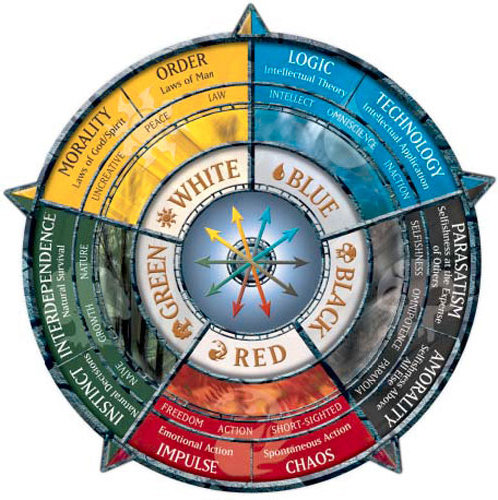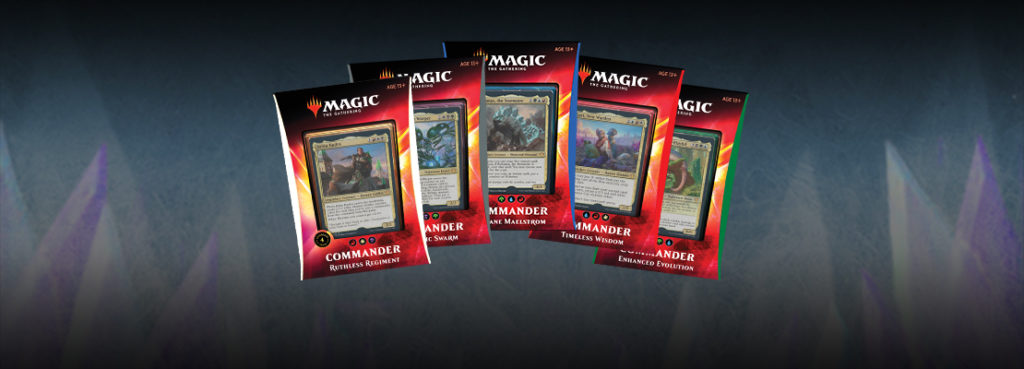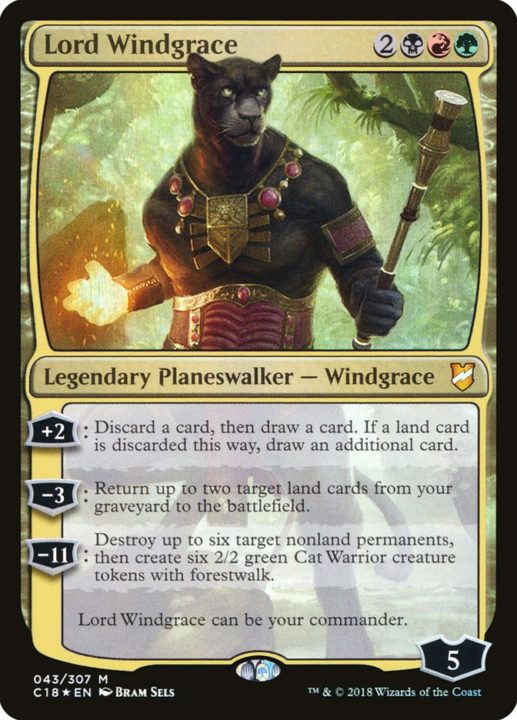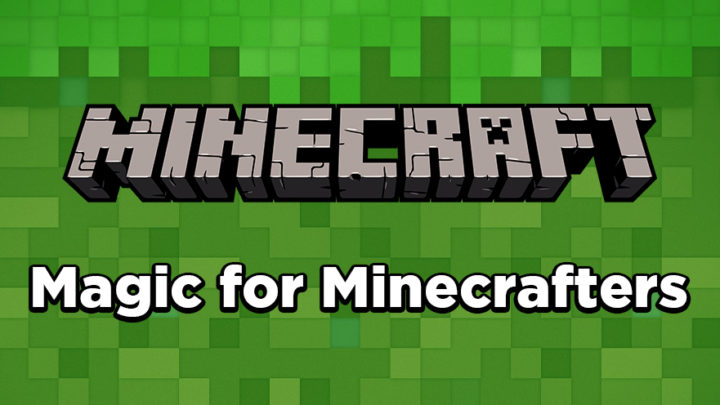Magic: the Gathering is a game about collecting resources, developing strategies that match your personal aesthetic, and competing with your friends. In those ways and others, it’s a lot like Minecraft. Here are some things you’ll like about Magic if you play a lot of Minecraft.
Creative Expression
Magic, like Minecraft, gives players a set of materials and rules for using those materials for personal expression. Among those tools is the color pie, which divides Magic’s cards into white, blue, black, red, and green categories, each with access to different mechanical and philosophical strategies.
5 Colors of Magic

White is the color of social order and keeping the peace. In Minecraft, a white player will help other players with their builds, defend them against griefers, and create shared builds for the server. They have the most organized storage system and are cautious about protecting their bases from mobs. White is associated with the Plains biome.
Blue is the color of knowledge and logic. In Minecraft, a blue player builds branch mines and has the most efficient redstone farms. They are likely to build with concrete and sea lanterns, and they’re the first to have enough bookshelves to level up their enchanting tables. Blue is associated with islands in Magic; the closest equivalent in Minecraft is the Warm Ocean biome.
Black is the color of self-interest and death. In Minecraft, a black player is most likely to play in single-player worlds; when they join a server, they keep to themselves except to trade with or steal from other players. They’re only interested in efficiency when it benefits them directly and don’t have much empathy for Minecraft‘s passive mobs. You may find them keeping their livestock in a pen that’s too small or breeding villagers and letting the ones they don’t want get killed by zombies. Black is associated with the Swamp biome.
Red is the color of passion and chaos. In Minecraft, a red player builds without a consistent aesthetic or organizational system, using whatever blocks they have lying around. They’re the most likely to take risks, whether they mean to or not: a red player may be the first to get elytra, or die several times in the End before they get to the first End City. They may dig straight down, not caring whether there’s lava underneath them, or they may accidentally punch a zombie pigman and fail to understand why other pigmen have started attacking them. Red is associated with the Mountain biome.
Green is the color of nature. In Minecraft, a green player builds their base to follow the contours of the landscape, using natural materials like wood and stone. They’re the most likely to tame dogs, cats, or parrots, and they’re content enough with the resources they can find or breed around them that they don’t bother with redstone farms. Green is associated with the Forest biome.
Color Pairs
You can also combine these colors to get even more philosophies, and it’s common for Magic players to personally identify with a combination of two or three colors. Here are some two-color combinations, with names from the factions in some of Magic‘s most popular sets.
- White/blue is Azorius, obsessed with organizational systems and server statistics.
- White/black is Orzhov, who charge other players diamonds for items and services and then hoard the diamonds.
- White/red is Boros, the most likely to be server mods.
- White/green is Selesnya, who play as vegetarians and put the most effort into community builds.
- Blue/black is Dimir, who have elaborately hidden bases and encourage other players to do PVP.
- Blue/red is Izzet, who do the most work with redstone.
- Blue/green is Simic, who breed mobs to see what happens and end up owning sheep in every possible color.
- Black/red is Rakdos, who love PVP and use lava as a decorative block.
- Black/green is Golgari, the early adopters of composters and undead mob farms.
- Red/green is Gruul, who never actually build a base and spend all their time hunting and exploring.
Choose Your Format
Just like you can play pretty much any version of Minecraft, with or without mods, the long history of Magic gives you myriad options for how to play, as long as you can get the cards. Not only are there a variety of officially supported formats, but you can also throw together a game from whatever you’ve got lying around.
There are also two official digital Magic platforms, Magic the Gathering Online and Arena. Playing online makes getting access to cards even easier, though you may have less control over who you play with. And just like in Minecraft modpacks, you can combine Magic sets that were never meant to be played together and discover all kinds of interesting interactions.
Cooperative and Competitive Play
When you play Minecraft on a server, you’ll often form relationships or rivalries with your fellow players, leading to everything from community builds to prank wars to griefing. Multiplayer Magic has opportunities for all these things, and nowhere is this more apparent than in the popular Commander format.
Commander can be played with any number of people, though three to five is usually best. Since Commander games are relatively long compared to games in other formats, you’ll have plenty of time to make and break alliances with your opponents. It’s also a great format for creative expression, since Commander decks include more cards than decks in most other formats. Commander decks are built around a single legendary creature, the deck’s “commander” card, which determines what colors and abilities can appear on the other cards in the deck.

Another Magic format that prioritizes playing politics is Conspiracy, a modification of the draft format designed for four-player games. Magic sets designed for Conspiracy have mechanics like dethrone that give you bonuses for attacking the player who’s farthest ahead, or melee, which gives you bonuses for attacking all your opponents at once. These give you more choices in who you ally yourself with – but remember, no alliance lasts long in multiplayer Magic, because only one player can win.
If you’re looking for a format where your friends won’t betray you, you may want to try Two-Headed Giant. In this format, you and a teammate share a life total and play against another pair of players.
Nature’s Compass
Here’s an example of a Commander deck that represents some of the core activities of Minecraft: exploring new lands and digging up their resources. Almost all the spells in this deck interact with land cards somehow: finding them in your deck, letting you play more of them in a turn, or giving you bonuses when you play them.
Commander
Lord
Windgrace

Creatures
Akoum
Hellkite
Avenger
of Zendikar
Beanstalk
Giant
Bloodghast
Crash
of Rhino Beetles
Cosi’s
Ravager
Courser
of Kruphix
Dire
Fleet Interloper
Embodiment
of Fury
Farhaven
Elf
Frontier
Guide
Geyserfield
Stalker
Grove
Rumbler
Jaddi
Offshoot
Jadelight
Ranger
Lotus
Cobra
Makindi
Sliderunner
Merfolk
Branchwalker
Multani,
Yavimaya’s Avatar
Nesting
Dragon
Nissa,
Vastwood Seer
Ob
Nixilis, the Fallen
Omnath,
Locus of Rage
Oran-Rief
Hydra
Plated
Geopede
Primeval
Titan
Ramunap
Excavator
Ranging
Raptors
Sakura-Tribe
Elder
Scute Mob
Seekers’ Squire
Skola
Grovedancer
Sporemound
Springbloom
Druid
Surrakar
Marauder
The
Gitrog Monster
Titania,
Protector of Argoth
Tomb
Robber
Tunneling
Geopede
Vinelasher
Kudzu
Yavimaya
Elder
Noncreature spells
Broken Bond
Crop
Rotation
Crucible
of Worlds
Deathsprout
Enter
the Unknown
Garruk,
Primal Hunter
Khalni
Heart Expedition
Nissa,
Vital Force
Nissa,
Who Shakes the World
Nissa,
Worldwaker
Path
of Discovery
Primeval
Bounty
Redcap
Melee
Retreat
to Hagra
Retreat
to Valakut
Searing Blaze
Scapeshift
Thaumatic
Compass
The
Mending of Dominaria
Tomb Hex
Wrenn
and Six
Zektar
Shrine Expedition
Zendikar’s
Roil
Lands
Cinder
Glade
Dragonskull
Summit
Fabled
Passage
Foreboding
Ruins
Game
Trail
Jund
Panorama
Luxury Suite
Rootbound
Crag
Smoldering
Marsh
Spire Garden
Woodland
Cemetery
12 Forest
6 Mountain
6 Swamp

Alex is an Azorius bureaucrat who dreams of joining the Selesnya Conclave. Their favorite color of mana is green, and they love brewing for Commander variants.

